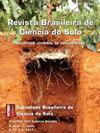重粘质Ferralsols土壤有机质团聚率的函数研究
IF 2
4区 农林科学
Q3 SOIL SCIENCE
引用次数: 0
摘要
重质粘土以其形成水稳定大团聚体的高能力而闻名。然而,对于不同粒径的大团聚体是如何随着有机质含量的增加而交换质量的,我们所知甚少。本研究旨在描述和详细描述这些土壤中有机质含量增加的聚集动力学。为了分离有机质对团聚体稳定性的影响,我们对三种重质粘质Ferralsols的剖面进行了采样。在这种采样场景下,建立了一个概念模型来计算不同大小类别的水稳性团聚体的聚集率。这种方法可以建立一个临界值,用于在研究土壤(≤0.50 mm)中分类微团聚体,基于它们在有机质含量增加时作为大团聚体“构建块”的行为。在有机质含量较高的表层土壤中,由于游离的微团聚体很少,预计大多数动态发生在大团聚体类之间。因此,在评估宏聚集体的稳定性时,将其细分为不同的大小类是很重要的。将大团聚体量化为单一类别(例如,>0.25或>0.50 mm)不足以代表重粘性Ferralsols中的大团聚体动力学。本文章由计算机程序翻译,如有差异,请以英文原文为准。
Aggregation rate as a function of soil organic matter in heavy clayey Ferralsols
: Heavy clayey Ferralsols are known for their high capacity to form water-stable macroaggregates. However, little is known about how different size classes of macroaggregates exchange mass with increasing organic matter content. This study aimed to characterize and detail aggregation dynamics with increasing organic matter content in these soils. Profiles of three heavy clayey Ferralsols were sampled to isolate the role of organic matter on the stability of aggregates. In this sampling scenario, a conceptual model was established to calculate the aggregation rate of different size classes of water-stable aggregates. This approach allowed the establishment of a critical value for classifying microaggregates in the studied soils (≤0.50 mm) based on their behavior as “building blocks” for macroaggregates when organic matter content is increased. In surface soil layers, where organic matter is higher, most dynamics are expected to happen between macroaggregates classes because free microaggregates are scarce. Consequently, it is important to subdivide macroaggregates into different size classes when evaluating their stability. Quantifying macroaggregates as a single class (e.g., >0.25 or >0.50 mm) was insufficient in representing the macroaggregation dynamics in heavy clayey Ferralsols.
求助全文
通过发布文献求助,成功后即可免费获取论文全文。
去求助
来源期刊

Revista Brasileira De Ciencia Do Solo
农林科学-土壤科学
CiteScore
3.00
自引率
11.80%
发文量
32
审稿时长
9-24 weeks
期刊介绍:
The Revista Brasileira de Ciência do Solo is a scientific journal published by the Brazilian Society for Soil Science (SBCS), founded in 1947, and is responsible for the propagation of original and inedited technical-scientific work of interest for Soil Science.
Contributions must not have been previously published or submit to other periodicals, with the only exception of articles presented in summarized form at professional meetings. Literature reviews are accepted when solicited by the Editorial Board.
 求助内容:
求助内容: 应助结果提醒方式:
应助结果提醒方式:


